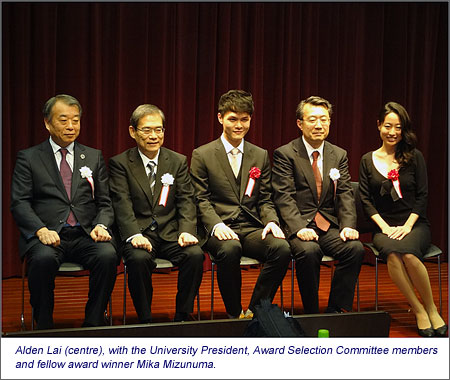| Speech by Mr Lai Yuanhong Alden at the University of Tokyo President Award Ceremony | |||||||||||||||||
| Contributed in April, 2013
I work with kidney patients. Their kidneys have failed, so they undergo dialysis treatment, which is very stressful mentally and physically. The mention of needles and injections is enough to make people cringe, but these patients need to endure big needles being stuck into their blood vessels three times a week. So I researched on the topic of health literacy, which is the way people get, use, and apply health information, to help them better manage their disease. The research has been published in a peer-reviewed journal. But today, I would like to tell you a little something about the patient that is not written in my paper. The patients’ thoughts. As I was doing my research, I realised these kidney patients constantly ask themselves, “Will I still be alive tomorrow?” “Will I still be able to see my family next week?” And I was also asking myself, “Will I still see them when I next go back to Singapore from Japan?” But despite the uncertainty between life and death, feeling hopeless and tired, they chose to spend more than half of their rest time to help me in my research. All 63 of them. So this moment of celebration is not about me. It is about the people who believed in me. The patients. And my mentors who have invested their time, even to reply to an email, for they saw the worth in helping me. Their beliefs brought me to this stage today. And I think they deserved to be thanked. So, to AIKOM exchange programme, which chose me as the only representative from National University of Singapore to complete an exchange on Komaba campus; Sato Yo Scholarship Foundation, for financially supporting my exchange; Todai School of Public Health, for trusting me to complete my Master’s that it done entirely in Japanese; Global Health Leadership Programme, which changed my outlook on leadership and contributions I am capable of as part of the public health community, and Cancer Scan, for the excellent internship and work opportunity. Thank you for seeing the worth in me. And I’m glad that the representatives of these organisations are all sitting here today to celebrate my joy. Comparing my achievements to the rest of award winners, I thought, “Wow. How can I compare to these potential Nobel Prize winners?” We have Mika, who discovered a new brain circuitry, people with amazing discoveries of enzymes, sleep cycle proteins to new LCD technology. In contrast, my achievements are, very international, yes. Ambassadorial roles for Japan and Todai? Yes. But compared to scientific inventions or discoveries we have witnessed tonight, they seem a little insignificant, and diverse. But if I may, I would like to say something about this diversity. I studied health psychology in Singapore, came to Japan to study public health, and will research on organisational management from now on. Compared to a scientific researcher, my interests are quite diverse. And there are good and bad parts of this diversity. The good part is, I can link up separate but related concepts, from various fields of health, physics, art to business etc., and borrow ideas from them to form my own innovative ones.  The bad part is, it takes time. A lot of time. And I get confused along the way, because I don’t have experiment protocols to find out what is ‘right’, or the consensus within the research community. I also believe, from a truly interdisciplinary perspective, there is no ‘right’. You create your own. So I concluded, if I know I am moving in the right direction, and put in my best in what I’m doing right now, even if I don’t see where my inclinations are bringing me to, it will pay off in the future. I remember an economics professor I’ve heard about, who only realised in his 60’s mentioned, “This is it! I want to devote myself to developmental economics in Vietnam.” Imagine, he was researching for more than 40 whole years to finally identify Vietnam is his thing. It doesn’t mean that the 40 years of research didn’t give rise to any impact, but rather indicates how the journey to finding yourself can be a long one. The bad part is, it takes time. A lot of time. And I get confused along the way, because I don’t have experiment protocols to find out what is ‘right’, or the consensus within the research community. I also believe, from a truly interdisciplinary perspective, there is no ‘right’. You create your own. So I concluded, if I know I am moving in the right direction, and put in my best in what I’m doing right now, even if I don’t see where my inclinations are bringing me to, it will pay off in the future. I remember an economics professor I’ve heard about, who only realised in his 60’s mentioned, “This is it! I want to devote myself to developmental economics in Vietnam.” Imagine, he was researching for more than 40 whole years to finally identify Vietnam is his thing. It doesn’t mean that the 40 years of research didn’t give rise to any impact, but rather indicates how the journey to finding yourself can be a long one. So for the distinguished professors, parents and students in this hall, if you know of someone around you who gets lost from time to time because of their diverse interests, because of their curiosity to look at the world in different lenses, please don’t discount that straightaway as a lack of focus. For they might come up with truly innovative ideas that can change the world. I encourage you to encourage them to stay open-minded and positive, because as long as they don’t give up, they will someday identify their strengths among the diversity, and exclaim, "This is it!"
|
|||||||||||||||||